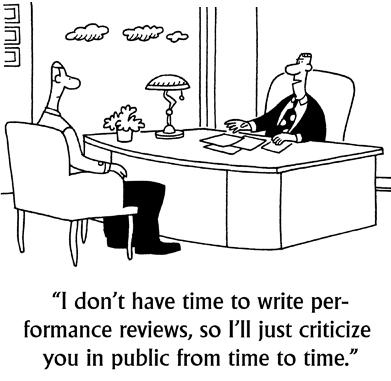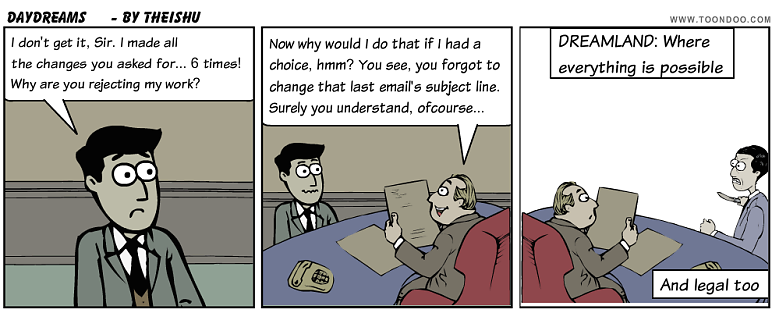Bosses are like sushi – or opera; they either win your heart and mind from the very beginning, or or they can scar you for life. You may eventually learn to tolerate them, but they will never be a part of the fond fables you tell your colleagues, friends, family and grandchildren. Good bosses, on the other hand, can make your professional – and often personal – life a pleasure. What’s more, their traits make you want to go to work, put in 200% and repeat that every day.
So what are the characteristics that make bosses good? Or bad? I’ve spent 16 years working with all kinds of bosses. I’ve been a boss myself at several companies. I’ve spoken to many friends and colleagues who’ve lamented or eulogized about their bosses. I’ve learned that it doesn’t matter what level your boss is at – a team leader all the way to a CXO – the traits that make them loved or hated are nearly similar. I’m going to devote this blog post to some of the qualities of a bad boss. Here are 33 attributes that make a bad boss; these are a superset – most bosses exude subsets of these toxins in varying degrees.
- Control Junkie: Your boss has a tough time truly delegating or letting go. He has an opinion about everything – often negative, sometimes destructive. This kind of boss thrives on controlling his employees, chastising them at every turn, and watching them break down, piece by piece.
- Being Right: Regardless of whether you’re right or wrong, your boss insists that he’s right, and makes you feel bad for allowing you to think that you are generally – or always – wrong. Such a boss needs his ego regularly massaged into thinking that he’s always right and you’re always wrong.
- Rude: Bosses too often fail to say please and thank you, rarely take the time for basic politeness or courtesy, and seldom acknowledge or extol the virtues of their subordinates. Such bosses make awful mentors, bad enablers and terrible teachers.
 Gives Blame / Takes Credit: Bad bosses take the credit for what goes right, and blame others for what goes wrong, in private (one-on-one), within the team and publicly. They’re not willing to stand in the background and let the spotlight shine on their employees, and instead want to hog the undeserved spotlight for themselves.
Gives Blame / Takes Credit: Bad bosses take the credit for what goes right, and blame others for what goes wrong, in private (one-on-one), within the team and publicly. They’re not willing to stand in the background and let the spotlight shine on their employees, and instead want to hog the undeserved spotlight for themselves.- Bad Listener: The boss is already formulating a response before you are done talking, because what you have to say doesn’t matter. Even worse, doesn’t even make a pretense of listening.
- Withholding: The boss expects you to know and share everything he/she needs to know, but doesn’t tell you enough and keeps secrets, often to the detriment of the employees and the company. Keeping secrets rarely works in most organizations, and when employees come to know of those secrets, they are often disheartened and distrustful of their managers.
- Anger: Why are bad bosses so mad? Perhaps they don’t like themselves too much and see their own bad traits in others. In any case, bad bosses feel free to fling anger at subordinates whenever they need to vent, with nary a care for the effect this has on their employees.
 Kills messengers: Tells you he wants to know things, but if it is bad news, or even not what he wanted to hear, jumps down your throat. Such bosses often ruthlessly vent on the messenger, in public and private, without stopping to think of the causes of the bad news or the effect the rebuke will have on the employees.
Kills messengers: Tells you he wants to know things, but if it is bad news, or even not what he wanted to hear, jumps down your throat. Such bosses often ruthlessly vent on the messenger, in public and private, without stopping to think of the causes of the bad news or the effect the rebuke will have on the employees.- Negativity: The glass is half empty to such a boss, and he always has a reason that your ideas won’t work. This negativity extends to employees, partners, vendors and anyone who is subordinate to him. Even when he is presented with a success story, this boss will find a way to denigrate the story and the person or company behind it.
- Delegate rather than balance work loads: This allows all attention to be diverted from them in case of failure. It may seem to them that are managing their people but in actuality they are creating work imbalances within the group. It can create unnecessary overtime for some and under utilization of others.
- Manage crises: Bosses that are crisis managers say goodbye to innovation and progression. Their reactive thinking is critical to the failure of their project/company. They are not finding ways to stop or reduce the amount of crisis that has to be managed and the competition passes them by.
- Mistakes are unacceptable: Being held accountable for wrong decisions is a fear for them. Making mistakes only helps you become a better person, manager, etc., yet they create an environment where employees’ mistakes are an anathema, and open to rebuke and ridicule. Employees under such bosses rarely take chances or think differently, for fear of being remonstrated.
 Humiliate or reprimand an employee within a group: This is a clear and visible sign of a poor leader. A good leader takes employee problems away from a group setting to a more private setting. If you have a boss that does this, it is time for a visit to human resources.
Humiliate or reprimand an employee within a group: This is a clear and visible sign of a poor leader. A good leader takes employee problems away from a group setting to a more private setting. If you have a boss that does this, it is time for a visit to human resources.- Not stand behind subordinates when they fail: They leave their people to hang out to dry. They rarely back them up, right, wrong, or indifferent. If an employee tries their best in a situation and they fail to come through, they are destructively publicly punished for the failure, instead of constructively encouraged.
- Encourage hard workers not smart workers: They are impressed with hard workers, who are usually defined by hours, and take twice as long to do the work. They dislike smart workers who understand the concept of time management and multi-tasking, workers who are innovative in their thinking.
- Act differently in front of their leaders: This is an indication of low self-confidence. They have doubts about their own ability to lead and they will act like servile little children when authority is present. However, they over-compensate in the other direction with their workers.
- Instill fear, not respect: In some workplaces, managers are feared even by employees who don’t know them – because their reputations precede them. Subordinates of such bosses fear – even loathe – meeting their bosses, and often rejoice when their bosses are away.
 Micromanage, don’t motivate: Good managers manage, bad managers micromanage. Micro-managers are not able to persuade or convince people of a vision and instead regularly have to crack a whip to achieve results. It could mean either the team is rotten to the core or they have failed to properly motivate (these ideas are not necessarily mutually exclusive). True discipline, as the saying goes, must come through liberty. If you fear that your team doesn’t function without you looking over their shoulders, the problem may not be them: Maybe it’s you.
Micromanage, don’t motivate: Good managers manage, bad managers micromanage. Micro-managers are not able to persuade or convince people of a vision and instead regularly have to crack a whip to achieve results. It could mean either the team is rotten to the core or they have failed to properly motivate (these ideas are not necessarily mutually exclusive). True discipline, as the saying goes, must come through liberty. If you fear that your team doesn’t function without you looking over their shoulders, the problem may not be them: Maybe it’s you.- Artificial distance: Bad bosses create real and perceived distance between themselves and their team. Humans detest hierarchies and those at the bottom resent being reminded of their place within them. The best managers sit with their teams in a symbolic gesture of solidarity and their behavior demonstrates genuine solidarity. The worst managers sit in solitary offices, usually with doors closed, and behave accordingly.
- No investment in their reports’ futures: Often, bosses will not outline a clear, fair and tangible growth path for their reports. Even if their reports aren’t working out, their primary concern isn’t for the person’s well being; instead, they are simply treated as “use and throw resources”. If you find yourself simply wishing someone off your team because they’re an obstacle to achieve your goals, you should probably question whether or not what the problem is a result of a skill-set mismatch, personality conflict or proper motivation. Only two of those three are solvable.
- Throw others under the bus: If you’re a manager, the buck must stop with you. Whether you’re explaining why your sales team didn’t hit its targets, or you’re justifying a decision by upper-management to change an incentive plan, the best managers accept responsibility for what happens on their watch. Avoiding responsibility hurts your credibility on both ends of the totem poll.
 Self-Serving Nature: If a leader doesn’t understand the concept of “service above self” he will not engender the trust, confidence, and loyalty of those he leads. Any leader is only as good as his or her team’s desire to be led by them. An over abundance of ego, pride, and arrogance are not positive leadership traits. Long story short; if a leader receives a vote of non-confidence from their subordinates… game over.
Self-Serving Nature: If a leader doesn’t understand the concept of “service above self” he will not engender the trust, confidence, and loyalty of those he leads. Any leader is only as good as his or her team’s desire to be led by them. An over abundance of ego, pride, and arrogance are not positive leadership traits. Long story short; if a leader receives a vote of non-confidence from their subordinates… game over.- One size fits all: Great leaders are fluid and flexible in their approach. They understand the power of, and necessity for contextual leadership. “My way or the highway” leadership styles don’t play well in today’s world, will result in a fractured culture, and ultimately a non-productive organization. Only those leaders who can quickly recognize and adapt their methods to the situation at hand will be successful over the long haul.
- Not Invested: Bad leaders are partially or completely uncommitted to investing in those they lead. They do not support their team, do not build into their team, do not mentor and coach their team, and they rarely care for their team. A leader not fully invested in their team won’t have a team – at least not an effective one.
- Not Accountable: Real leaders are accountable, both to their superiors and to their subordinates. Bad leaders, instead, blame others, claim credit for the success of their team, and rarely accept responsibility for failures that occur on their watch. Most of all, good leaders are accountable to their team – leaders not accountable to their people will eventually be held accountable by their people.
- Abhor criticism: Bad leaders – in fact, bad companies – don’t implement 360 degree evaluation and feedback processes, because their leaders despise being criticised by their subordinates. When criticized or corrected by their workers, such leaders retaliate against their workers in various forms, including sabotaging their careers.
 Tyranny: Tyranny is essentially management by intimidation, and has been a complaint heard repeatedly from workers over the years. It comes in many forms. A leader, for instance, may threaten to demote a worker unless the worker pulls an all-nighter to fix a problem (sometimes that the leader caused). The worker most likely will give in and work until the early morning hours, but will also resent the leader so much, that the relationship will be irrevocably harmed. Such leaders use the stick far more than the carrot; often they don’t use the carrot at all, and rely wholly on the stick to “discipline” their workers.
Tyranny: Tyranny is essentially management by intimidation, and has been a complaint heard repeatedly from workers over the years. It comes in many forms. A leader, for instance, may threaten to demote a worker unless the worker pulls an all-nighter to fix a problem (sometimes that the leader caused). The worker most likely will give in and work until the early morning hours, but will also resent the leader so much, that the relationship will be irrevocably harmed. Such leaders use the stick far more than the carrot; often they don’t use the carrot at all, and rely wholly on the stick to “discipline” their workers.- Inappropriate delegation: This happens when a leader manipulates a subordinate to do work that the leader should be doing. But it can also involve withholding assignments. A subordinate who has long awaited a particularly challenging assignment may find at the 11th hour that the leader has decided to take the assignment or has taken undue credit for doing it. Subordinates in situations like these may find their career development stymied. Too often, they end up never taking on work that will develop the skills they need to gain more responsibility and receive attention from senior management.
- Politicking: It involves more malicious acts, like sabotage and taking undue credit. Employees often encounter many instances of sabotage, including their boss’s campaigning behind their back to damage their reputation. If a boss is senior enough in the company and does such a thing, it can cause irreparable damage to an employee’s reputation and promotion prospects. Some bosses criticize their employees behind their backs and blame them for mistakes (that the mentors sometimes themselves made). Equally damaging: bosses who steal their employees’ ideas. Such bosses dislike opportunities and successes that come by their employees’ ways.
- Permanent potty mouth: Such bosses almost never have a nice thing to say about anyone they meet, be it employees, ex-employees, competitors, colleagues, partners or vendors. Such bosses are always critical of people, even if the people being criticized are of high standing in society or in the industry. Such negativity may stem from a low-self confidence or an aberrant – and incorrectly – high sense of self-worth.
- Bad mentors: It goes without saying (but I’ll say it anyway) that for protégés to benefit, bosses must be mentors who must show an active interest and act in a positive way to advance their career and personal learning. Poor mentors may be preoccupied with challenges in their own careers, excessively busy from a heavy workload or insecure about their standing in the organization. They can be evasive or tyrannical when called upon for advice or support, or always put their own priorities first.
- Neglect: Amongst the worst crimes that bosses can commit are to neglect the growth of the people under them. They damage their employee’s egos, or waste their employee’s time. Such neglect can lead to employees’ feeling that their leaders don’t value the relationship. At worst, they may withdraw from the relationship or even leave the department or organization. At the least, they will be so annoyed or disgusted or hurt that they won’t be open to accepting any guidance that might occur.
- Orders, not guidance: The Bad Boss: You ask questions, they give you instructions. The Good Boss: You ask questions, they ask better questions to make you think, learn and understand. Good bosses offer support and encouragement as well as wisdom. Most importantly, they leave you plenty of room to figure out your own way of doing things rather than imposing their way as the only way.
I’m sure there are many more traits that make for a bad boss, and I’d love to hear them. The result of having such people at the helm of projects, teams and companies is that at best, progress and growth are frustratingly slow, painful and continuously retarded by employee attrition and loss of productivity and innovation. At worst, the projects, teams and companies fail, and need to be shut down.
Good mentors/leaders/bosses are truly interested in your career. They may be there for advice and to socialize, but more important, they should be in a position to advance your career whenever possible. A caring leader can insure that you are considered for important opportunities for advancement or visibility within your field of interest. A good mentor is someone who takes care of you. Good bosses listen to learn, guide to grow and elevate and empower their workers.
When looking for a company or a boss, look for a person who guides with wisdom and will be there to let you fall and pick you up, someone who is always open and caring, and always tells you the truth in gentle ways, someone who is heavily invested in your growth, who legitimately wants you to succeed and will impart all the wisdom they spent years learning onto you in hopes that you won’t make the same mistakes.

Amazing and simply true..Loved every bit of it!!
Good one Kunal…
Babe, so very true!!!
Simply Super Blog.